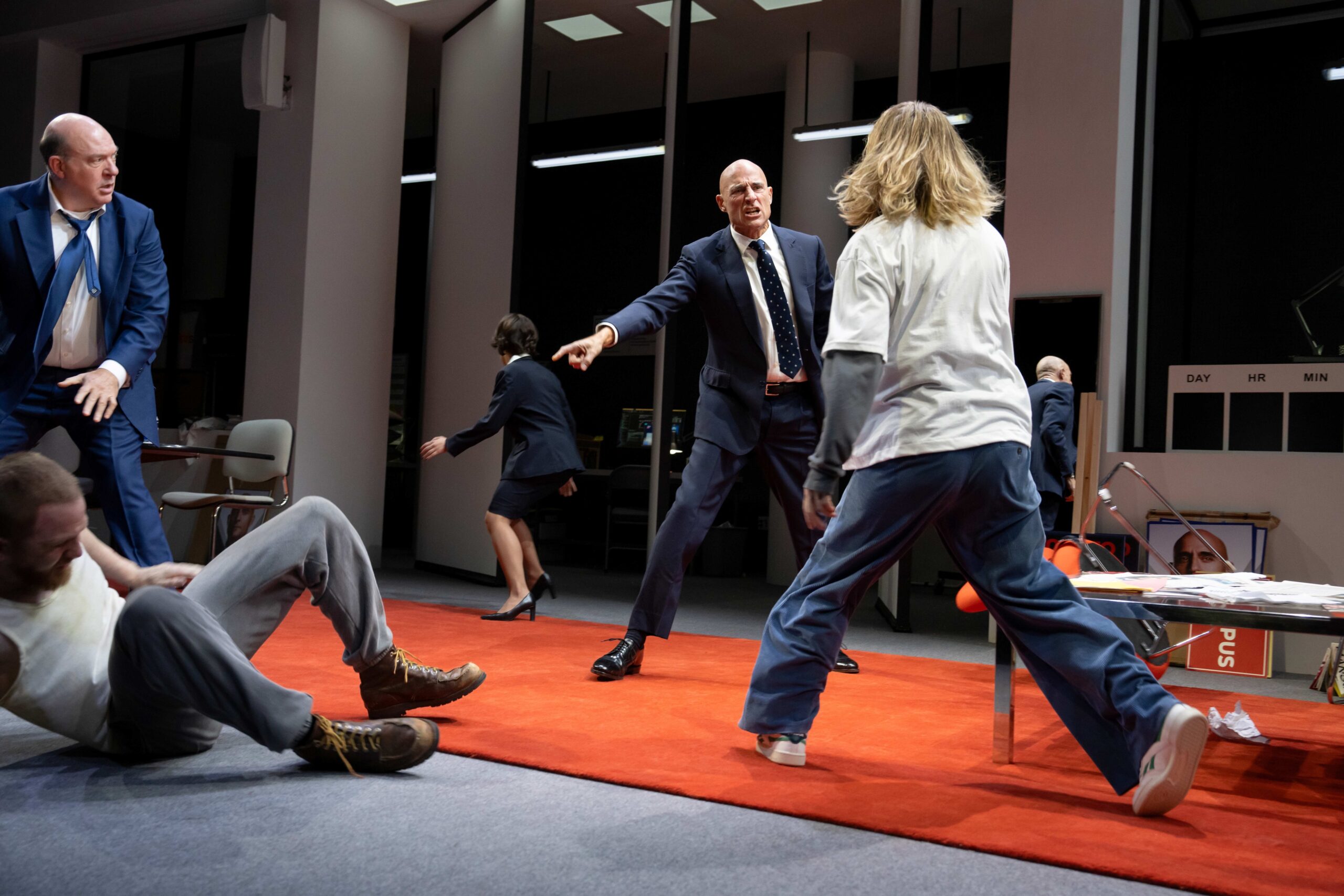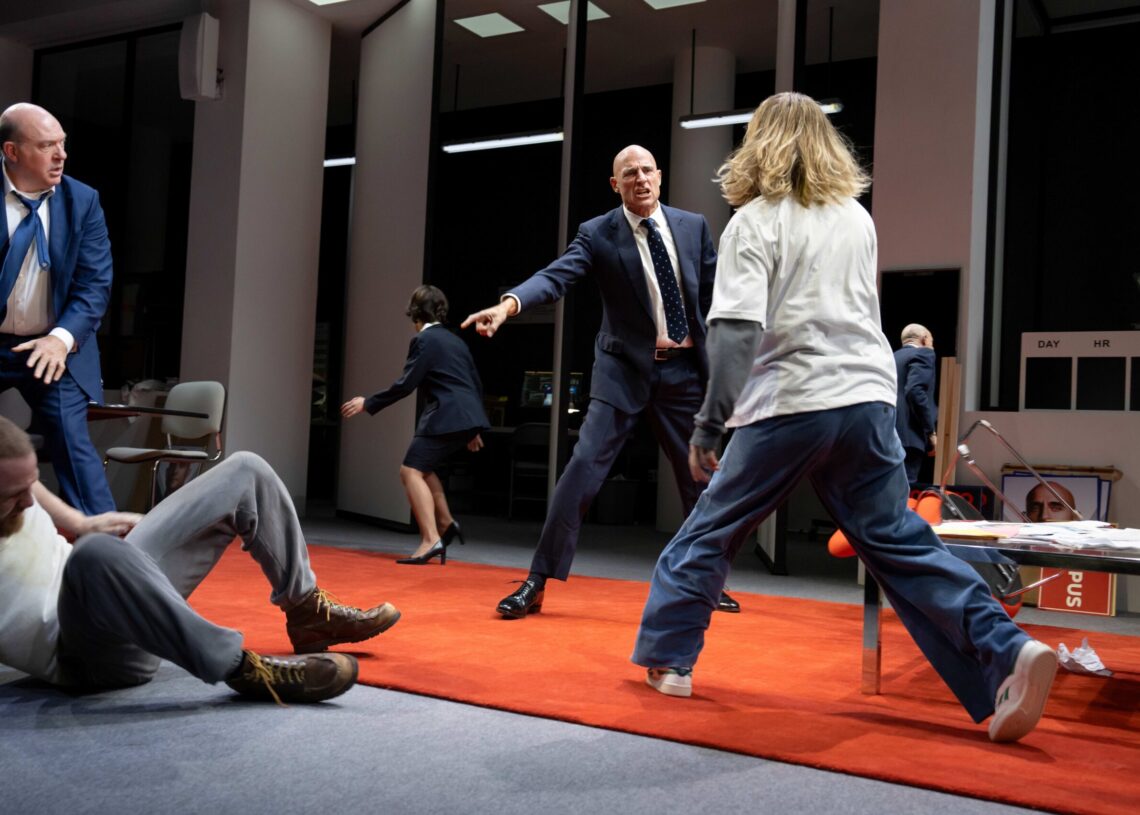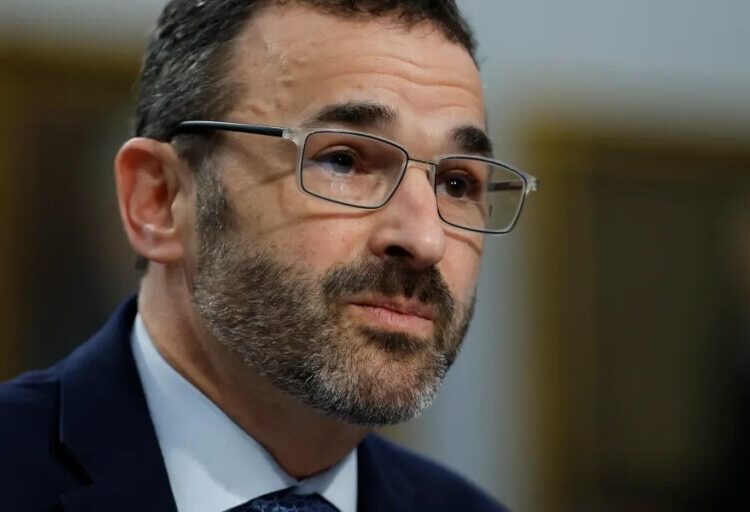
NEW YORK — In the corner of the campaign headquarters onstage, a countdown clock ticks toward the inevitable: When polls close in a couple of hours, a noble and progressive Oedipus appears likely to win a major election. Most people in the audience also know that within that time, he’ll discover unspeakable horrors and self-destruct.
NEW YORK — In the corner of the campaign headquarters onstage, a countdown clock ticks toward the inevitable: When polls close in a couple of hours, a noble and progressive Oedipus appears likely to win a major election. Most people in the audience also know that within that time, he’ll discover unspeakable horrors and self-destruct.
The taut spin on “Oedipus” now on Broadway after a West End run last fall is a rare and magnificent feat of adaptation: Writer and director Robert Icke draws Sophocles’ ancient play into the present while deepening its timeless explorations of power, desire and fate. As the doomed mother-son couple, Lesley Manville and Mark Strong deliver two of the most captivating performances on New York stages this year, in a production that combines the intrigue of a primal tragedy with a modern political thriller.
The literal plague tormenting ancient Thebes is here implied to be part of the status quo: When the candidate first appears, in a prologue news conference projected on a massive screen (video design is by Tal Yarden), he speaks of a grassroots movement rising up against wealth disparity, discrimination and lies. (The office he’s running for is unspecified, but it’s presumed to be the highest there is.) In a speech that echoes U.S. politics, Oedipus vows to investigate a contested crime — the death of a previous ruler, his wife’s first husband — and to produce his own birth certificate for skeptics questioning his origins.
What follows is a tightly constructed dynastic drama, with the sleek sophistication of prestige TV and the resonance of a twisted fable integral to psychoanalysis. The setting, a temporary office with soaring ceilings and a mishmash of furniture (designed by Hildegard Bechtler), quickly becomes a cauldron of secrets — nearly everybody seems to have at least one — as the voting results trickle in. Compressing the action into real time makes the entire intermissionless two hours feel like an edge-of-your-seat climax.
Though if audiences find themselves leaning in, that’s at least partly an issue of scale: The staging is somewhat swallowed by the cavernous Studio 54, often a home for musicals, and could benefit from cranking up the actors’ mics. (The quiet onstage is underscored by ambient, unsettling effects from sound designer Tom Gibbons.) Icke’s dexterity with language, and deft elaborations on the play’s themes, would be a shame to miss.
Take Oedipus rhapsodizing, at the makeshift family dinner table, about the “colossal, chaotic” beauty of love, which he says “isn’t appropriate” or “ruled by manners” but “the thing that everyone wants” in their own way. Sure, but also: Cue the full-body cringe. In one of Icke’s smart updates, Oedipus accepts that his son Polyneices (James Wilbraham) is gay, doubling down on his faith in the freedom to love. Just wait until Oedipus finds out what he’s done for love himself.
Strong, last on Broadway in “A View From the Bridge” in 2015, makes an enviable candidate of Oedipus; if it weren’t for all of the unfortunate discoveries, you would wish this guy could be on a real ballot. He has a combative streak, turning on his brother-in-law Creon (John Carroll Lynch), who a new-age mystic (Samuel Brewer) says will rule once Oedipus’s horrible crimes are revealed. But he has integrity, too, and such steely-eyed devotion to his wife that it’s hard to believe Oedipus will abandon her regardless of the truth.
The actors’ proximity in age — Strong and Manville are only seven years apart — reflects another of Icke’s compelling revisions to the story. In a wrenching confession, Manville’s Jocasta reveals that she was just 13 years old when her late husband forced her into conceiving and abandoning a child. Manville, familiar to fans of “The Crown” and “Phantom Thread,” performs an extraordinary balancing act: Her Jocasta is at once a doting lover, a callous mother (especially to Antigone) and a pawn who grew into a formidable matriarch.
The drama is also enriched by the addition of Oedipus’s adoptive mother (played by Anne Reid), who has something important to tell him but keeps getting brushed aside, and by the expanded role of his daughter Antigone (Olivia Reis). The former has the wisdom of age, while the latter gazes into the future with a kind of fatalism: “Do whatever you like. Have a party. Take your clothes off,” Antigone says. “Everyone ends up dead, so may as well have the wildest available journey.”
Icke, 38, who made his Broadway debut in 2017 with a bloody and polarizing take on “1984,” adapted and directed with Duncan Macmillan, himself appears to be looking toward the future with bold takes on classic texts. (His production of “The Doctor,” based on a 1912 play by Arthur Schnitzler, ran at the Park Avenue Armory in 2023.) The ingenuity and precision he delivers with “Oedipus” promise more wild journeys ahead.
Oedipus, through Feb. 8 at Studio 54 in New York. 2 hours without an intermission. oedipustheplay.com.
The post Here’s how to do ‘Oedipus’ in a way that feels totally of the moment
appeared first on Washington Post.




